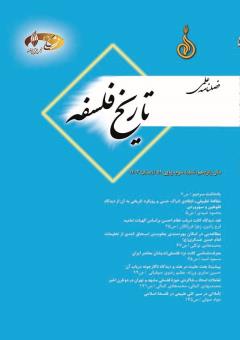مطالعهیی در امکان بهرهمندی یعقوببن اسحاق کندی از تعلیمات امام حسن عسکری(ع)
محورهای موضوعی : ریشهشناسی مکاتب و آراء فلسفی در ادوار قدیم و جدید
1 - استادیار گروه فلسفه و کلام اسلامی، پژوهشگاه حوزه و دانشگاه، قم، ایران
کلید واژه: امام عسکری(ع), کندی, ابوزید بلخی, قرآن, رؤیت خداوند متعال,
چکیده مقاله :
آموزههای الهیاتی اهلبیت (علیهمالسلام) را میتوان یکی از منابع احتمالی فلسفة اسلامی در روزگار تکوین آن، قلمداد کرد. در راستای بررسی این منبع احتمالی، امکان مواجهۀ مستقیم برخی از حکمای مسلمان با ائمه میتواند سندی مهم در موجه بودن این احتمال، و بلکه محقق بودن آن، باشد. بررسی میراث متقدمین، دستکم ما را به دو شاهد درمورد ارتباط ابویوسف یعقوببن اسحاق کندی با امام حسن عسکری(ع) رهنمون میسازد. در یکی از ایندو، بتصریح از کندی یاد شده و در دیگری، شخصی با عنوان «یعقوببن اسحاق» با کنیه ابویوسف، مورد اشاره قرار گرفته است. بر اساس دادههای موجود در ایندو شاهد و سنجش آنها با سایر دادههای تاریخی و همچنین نمایانبودن مباحث بیان شده از سوی امام عسکری(ع) در آثار کندی، امکان ارتباط کندی با امام(ع) بسیار موجه بنظر میرسد و از اینرو، بررسی دیگر آثار کندی، و بلکه مکتوبات سایر حکمای مسلمان، از حیث تأثر از آموزههای الهیاتی اهلبیت (علیهمالسلام) امری معقول است.
The theological theorems of the People of the House (ʻa) can be viewed as one of the potential sources of Islamic philosophy in the course of its development. When investigating this potential source, the likelihood of the direct encounter of certain Muslim philosophers with Imāms (ʻa) can be considered an important proof for the justification and even realization of this possibility. A study of the legacy of predecessors leads us to at least two proofs regarding the contact of Yʻaqūb Ibn Isḥāq al-Kindī with Imām Ḥassan Asqarī (ʻa). One of them explicitly refers to al-Kindi, and the other refers to someone called “Yʻaqūb Ibn Isḥāq” with the nickname of Abu Yusuf. Based on the content of these two proofs, their comparison with other historical data, and the clear presence of Imām ʻAsqarī’s discussions in al-Kindī’s works, the possibility of a relationship between them seems quite justified. Accordingly, the study of the other works of al-Kindī and those of other Muslim philosophers in terms of their being influenced by the theological teachings of the People of the House (ʻa) is a rational undertaking.
قرآن کریم.
ابنبابویه، محمدبن علی (1398) التوحید، قم: جامعة مدرسین.
ابنبابویه، محمدبن علی (1413ق) من لا یحضره الفقیه، قم: مؤسسة نشر اسلامی.
ابنطاووس، رضیالدین (1368) فرج المهموم فی تاریخ علماء النجوم، قم: دار الذخائر.
ابنقولویه، جعفربن محمد (1356ق) كامل الزیارات، نجف: دار المرتضویة.
ابنندیم، ابوالفرج محمدبن اسحاق (1417ق) الفهرست، بیروت: دارالمعرفة.
ابوریده، محمد (1950م) «مقدمه»، رسائل الکندی الفلسفیة، قاهره: دار الفکر العربی.
افندی، عبداللهبن عیسیبیگ (1401ق) ریاض العلماء، تهران: خیام.
امین، سیدمحسن (1403ق) اعیان الشیعة، بیروت: دار التعارف للمطبوعات.
بغدادی، قاضی عبدالجبار (۲۰۰۶م) تثبیت دلائل النبوة، قاهره: دار المصطفی.
بیهقى، علىبن زید (1365) تاریخ حكماء الاسلام، دمشق: مطبعة الترقی.
توحیدی، ابوحیان علیبن محمد (1347) المقابسات، مصر: المطبعة الرحمانیة.
توحیدی، ابوحیان علیبن محمد (1424ق) الإمتاع و المؤانسة، بیروت: المکتبة العصریة.
توکلی، محمدهادی (1401) «نقد و بررسی تفسیر «رؤیت خداوند» به تعلق علم ضروری به خداوند»، معرفت کلامی، شمارة 28، ص96ـ81.
جرجانى، عبدالقاهربن عبدالرحمن (بیتا) دلائل الإعجاز فی علم المعانی، بیروت: دار الكتب العلمیة.
حرّانی، ابنشعبه (1404ق) تحف العقول عن آل الرسول (ص)، قم: جامعۀ مدرسین.
حسنزاده آملی، حسن (1365) هشت رساله عربی، تهران: مؤسسة مطالعات و تحقیقات فرهنگی.
حموی، ابوعبدالله یاقوت (1414ق) معجم الادباء، بیروت: دار الغرب الاسلامی.
سجستانی، ابوسلیمان محمدبن طاهر (2004م) منتخب صوان الحكمة، پاریس: دار بیبلیون.
شعرانی، ابوالحسن (1382) «تعلیقه بر شرح الکافی»، در مازندرانى، محمدصالح، شرح الكافی؛ الأصول و الروضة، تهران: اسلامیه.
شعرانی، ابوالحسن (1406ق) «تعلیقه بر الوافی»، در فیض كاشانى، محمدمحسن، الوافی، اصفهان: كتابخانه امام أمیرالمؤمنین على علیهالسلام.
شهرزوری، محمدبن محمود (1383) رسالة فی العلوم الإلهیة و الأسرار الربانیة (الشجرة الإلهیة)، تهران: مؤسسة حکمت و فلسفه.
شهرزوری، محمدبن محمود (2007م) تاریخ الحکماء قبل ظهور الإسلام و بعده «نزهة الأرواح و روضة الأفراح»، پاریس: دار بیبلیون.
طبرسی، احمدبن ¬علی (1403ق) الاحتجاج علی اهل اللّجاج، مشهد: نشر مرتضی.
طبری، محمدبن جریر (1967م) تاریخ الأمم و الملوک، بیروت: دار التراث.
طوسى، محمدبن حسن (1373) رجال الطوسی، قم: مؤسسة نشر اسلامی.
طوسى، محمدبن حسن (1414ق) الأمالی، قم: دار الثقافه.
طوسى، محمدبن حسن (1420ق) فهرست كتب الشیعة، قم: ستاره.
عامری، ابوالحسن (1375) رسائل ابو الحسن عامرى، تصحیح سحبان خلیفات، تهران: مركز نشر دانشگاهى.
عسقلانی، احمدبن حجر (1390) لسام المیزان، بیروت: مؤسسة الأعلمی للمطبوعات.
کلینی، محمدبن یعقوب (1407ق) الکافی، تهران: اسلامیه.
کندی، یعقوب بن اسحاق، (بیتا/ مخطوط)، فی ملک العرب و كمیته، در: British Library: Oriental Manuscripts, Add MS 7473, ff 175v-178v, in Qatar Digital Library
کندی، یعقوببن اسحاق (1950م) رسائل الکندی الفلسفیة، تحقیق محمد ابوریده، قاهره: دار الفکر العربی.
مازندرانى (ابنشهرآشوب)، محمدبن على (1379) مناقب آل أبی طالب علیهم السلام، قم: علامه.
مازندرانى (ابنشهرآشوب)، محمدبن على (1380) معالم العلماء، نجف: المطبعة الحیدریة.
مازندرانى، محمدصالح (1382) شرح الكافی؛ الأصول و الروضة، تهران: اسلامیه.
مجلسى، محمدباقر (1404ق) مرآة العقول فی شرح أخبار آل الرسول، تهران: اسلامیه.
مدرس زنوزی (طهرانی)، علی (1376) بدایع الحکم، تهران، الزهراء.
ملاصدرا (1383) الحکمة المتعالیة فی الأسفار الأربعة، ج3، تصحیح و تحقیق مقصود محمدی، تهران: بنیاد حکمت اسلامی صدرا.
نتون، یان ریچارد (1397) خدای متعال، ترجمۀ سیده لیلا اصغری، تهران: حکمت.
نجاشی، احمدبن على (1365) رجال النجاشی، قم: مؤسسة نشر اسلامی.
واسطی بغدادی، احمدبن حسین (1364) الرجال (لابن الغضائری)، قم: دار الحدیث.
https://ansari.kateban.com


